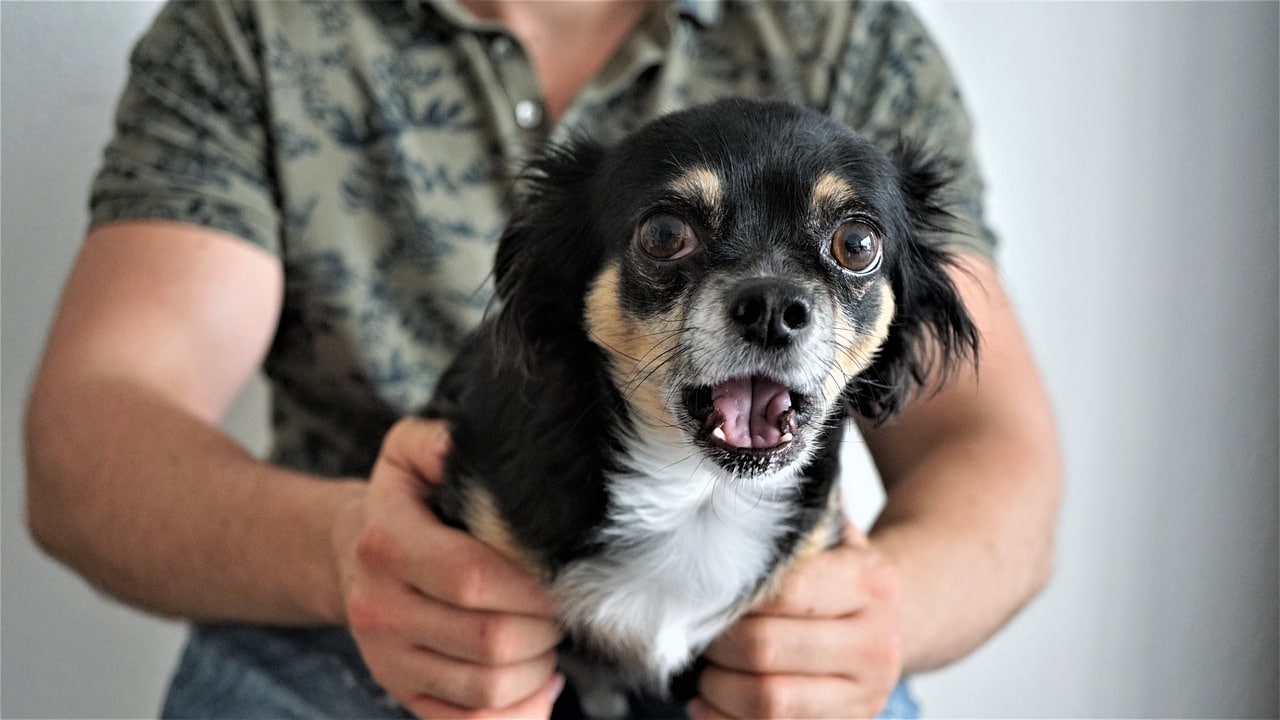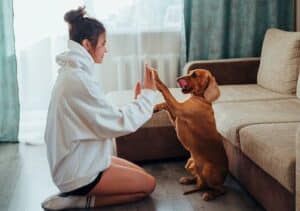Have you ever wondered why does my dog sit on me?
Dogs are known for their affectionate nature towards their owners. They often show their love by cuddling up with their human friends or sitting on them. While some dog owners find the behavior endearing, others may find it annoying. If you have ever wondered why your furry friend insists on sitting on you, we got you covered. In this post, we will explain what motivates dogs to sit on their owners. Read on to learn more about this fascinating behavior of our four-legged friends.
Seeking Attention
Your dog may sit on you to get your attention. Dogs observe their owners and learn how to get their attention, and if they find that sitting on you works, they will continue to do so. Your pet loves to be around you and sitting on you helps them feel more connected. So, the next time your dog sits on you, give them some attention and affection.
Comfort and Security
Dogs also like to sit on their owners because it makes them feel comfortable and secure. Your furry friend likes the warmth and softness of your lap or body, and it helps them feel safe and protected. In the wild, dogs often huddle together for warmth and protection. Sitting on you is a similar behavior that satisfies your dog’s natural instincts.
Marking Their Territory
Dogs are territorial animals, and they mark their domain through scent and movement activities. Sitting on you could be your dog’s way of marking their territory and laying claim to you. They want other animals, potential threats or visitors to know that you belong to them and that they are responsible for protecting you.
Anxiety or Stress
In some cases, dogs may sit on their owners due to anxiety or stress. If your pet is anxious or stressed, they may seek comfort and security by sitting on you. It’s their way of calming themselves down. If you notice other signs of anxiety in your pet, such as excessive barking, panting, or pacing, consult your veterinarian for help.
Affection and Love
Lastly, dogs often sit on their owners as a display of their love and affection. Your pet sees you as their best friend and family member, and sitting on you is their way of expressing how much they care about you. Your furry friend may also feel happy and content when they are close to you, and sitting on you is one way to achieve this feeling.
Understanding When Your Furry Friend is Sitting on You Due to Anxiety

Dogs often form an inseparable bond with their owners, bringing joy, comfort, and companionship. However, some dogs may start exhibiting strange behavior, such as a dog sitting down on their owner persistently. When that happens, it becomes essential to examine the behavior and determine if it’s normal or if it could be indicative of underlying anxiety. Let’s discuss signs that your dog is sitting on you out of anxiety and what you can do to help.
Consistent Pacing or Panting
If your dog constantly gets up and down and starts pacing while whining, it could be a sign of anxiety. Stressed dogs are likely to behave this way and may even pant persistently. Pacing and panting are signs of discomfort in dogs; thus, you should take note of it and check if your dog is sitting on you out of anxiety.
Shaking/Flinching
When your dog’s sitting down on you are they shaking? That could be a sign of anxiety. Dogs that are startled easily, flinch excessively, or start shaking out of nowhere are likely experiencing anxiety. Additionally, if your dog sits close to you, seeking comfort, it could be an indication that they want to be comforted and calmed.
Constant Licking or Chewing
Have you noticed your dog constantly licking or chewing his paws while sitting on you? Well, it could indicate some level of anxiety. Dogs tend to be quite obsessive when anxious and will often develop nervous ticks such as constant licking or chewing of paws, belly, and limbs. It’s worth observing how often your dog engages in this behavior when free and around social animals for you to determine if anxiety is causing it.
Refusal to Move
Your dog might be suffering from separation anxiety if they refuse to move or change position after sitting on you. An anxious dog may feel insecure, scared to move and change its position, especially if it’s not comfortable with its surroundings. If this is the case, you might want to observe your dog up close and determine the cause of anxiety, providing measures to help it.
Tensed Body Language
If your dog leans on you or your lap dog persistently sits on you tightly, it could be that they’re seeking comfort or protection because of anxiety. Dogs with bent backs or bowed heads, squinty eyes, and flattened ears when they’re sitting or lying can also indicate anxiety. It’s even more worrisome if the dog consistently shows a tensed body language throughout the day, especially when it’s time to sleep.
It is essential to understand your dog’s behavior patterns to determine if they are exhibiting signs of anxiety. If your dog shows any of the above behaviors, it’s time to take action.
Talk to your vet, plan interactive activities with therapy dogs, provide soothing music, comfortable beds, toys, and bond more with your dog through consistent training or exercise. You might also want to address any issues that could be causing your dog anxiety. With your assistance, most dogs can come out of their anxiety and start behaving normally again.
Why Does My Dog Get Aggressive When Sitting on My Lap?

Have you ever experienced your furry friend getting aggressive towards other people when sitting on your lap? This can be quite daunting and frustrating, leaving you puzzled and unsure how to handle the situation. Understanding the reasons behind this behavior can help you modify it, making for a happier and more harmonious home for you and your pet. So, why does your dog get aggressive towards other dogs or people when sitting on your lap? Let’s take a look at some of the possible reasons.
Territorial Instincts
Dogs have an inherent need to protect their territory. In their mind, to sit in your lap is a place of safety and comfort, and anyone trying to intrude this space becomes a threat that they feel the need to protect against. This territorial instinct is especially strong in smaller dogs as they tend to feel vulnerable around unfamiliar people.
Fear and Anxiety
Dogs can also become aggressive towards new people due to a lack of socialization or previous unpleasant experiences with strangers. When your dog feels scared or anxious, they may lash out to protect themselves, and as they are sitting on your lap, they perceive you as their protector.
Possessive Behavior
Dogs can also become possessive of their owners, causing them to become aggressive towards anyone they see as competition. This can happen towards children, rescue dogs, other pets, or even friends and family who try to interact with you while your dog is on your lap.
Pain or Discomfort
Sometimes, dogs can become territorial and aggressive towards lap dogs when they are in pain or discomfort, and their lap is the only place where they feel comfortable. If your dog is exhibiting unusual aggression, it is advisable to take them to the vet to rule out any underlying medical conditions.
Unbalanced Hierarchy
Dogs are pack animals and thrive on a clear hierarchy. When you allow your dog to sit on your lap as they please, you may unknowingly be reinforcing a belief that they are the dominant party in the relationship. This can lead to territorial and possessive behavior and aggressive tendencies towards others.

There are several reasons why your dog may become aggressive towards other people when sitting on your lap, including territorial instincts, fear and anxiety, possessive behavior, pain or discomfort, and unbalanced hierarchy. Understanding why your dog is behaving this way can help you alleviate the aggression by creating a safe and harmonious environment for your furry friend.
Keep in mind that it is critical to address any aggressive behavior early before it escalates and becomes a more significant issue. If you are struggling to modify your pet’s aggression successfully, consulting with a professional dog trainer or behaviorist can be a helpful step in the right direction. With patience and persistence, you can help your dog feel more comfortable and confident in new situations while keeping yourself and others safe.
In summary, dogs sit on their owners for various reasons, from seeking attention to feeling comfort and security. Dogs love to be close to their owners and show their affection in different ways, including sitting on them. If you find it frustrating when your pet sits on you, consider alternative ways of showing them love and attention, such as playing or cuddling. Your dog’s behavior is an indication that they trust and love you, and with proper care and training, you can strengthen your bond further. So, embrace those cuddles and enjoy the unconditional love of your furry friend.
If your dog seems to be aggressive or protective while on your lap, Ruff House Dog Training will work with your furry friend so you and your dog can have bonding time without aggressiveness.












